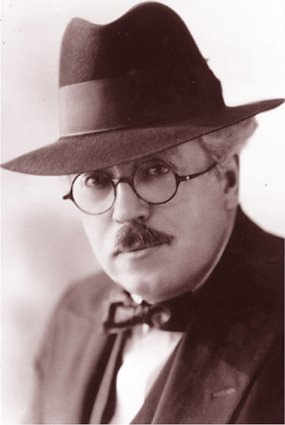In case you had forgotten, or possibly never knew, the title is taken from one of the most famous medieval songs ever composed. It appeared in a collection of manuscripts from thirteenth-century England, written in old-fashioned square notation on a staff of five red lines. Strictly speaking, it isn’t actually a song at all, but a piece called a rota which is similar to a round although slightly more complicated. It’s also the oldest known musical composition that uses six-part polyphony so by the standards of the day it was well ahead of its time, although to modern ears it sounds distinctly medieval.
It’s thought that the work might have been composed by someone variously identified as Willelmo de Winchecumbe, Willelmus de Winchecumbe or the slightly enigmatic W de Wyc. By all accounts he was a composer, copyist and sub-deacon at the priory of Leominster in Herefordshire during the late thirteenth century. He might even have been a monk but whether he wrote the famous song, well, no one knows for sure.
 Frank Bridge.
Frank Bridge.
The words are in the old Wessex dialect of Middle English and as different from modern English as to be virtually incomprehensible. The title of course, means “summer is arriving” and the jolly song rejoices in the coming of the warmer weather to the English countryside and especially the arrival of the cuckoo. There are references to bleating ewes, prancing bullocks and flatulent goats, though the medieval lyrics use more rustic terminology.
I mention this because even though the composer’s identity is uncertain, it’s the earliest known European composition that celebrates the coming of summer. Much more music on a similar theme was to follow, especially some of the madrigals of the sixteenth century and the art-songs of the nineteenth, celebrating what Longfellow later described as “that beautiful season.”
Frank Bridge (1879-1941): Symphonic Poem, Summer. Cole Conservatory Symphony Orchestra cond. Johannes Müller-Stosch (Duration: 09:27, Video: 720p HD)
Although the music of the English composer Frank Bridge was once quite popular it has fallen out of fashion. Bridge was a very active performing musician around the turn of the last century, playing viola in several string quartets and sometimes conducting orchestras. Cruel time has revealed the rather acerbic Frank Bridge, who was also the teacher of Benjamin Britten, to be one of the lesser stars of the English musical firmament. Bridge’s music is much less influential than his contemporaries, Ralph Vaughan Williams, Gustav Holst and Arnold Bax. Even so, his music is beautifully crafted and rich in haunting imagery.
Summer is a fine example of his pre-war composing style and written in the fateful year of 1914, so the joys of that particular summer were fairly short-lived. It’s composed in an approachable style and perhaps, compared to what Stravinsky was doing at the time, even a bit old-fashioned. But it marked a change of style for Bridge because in later years he turned to a more astringent musical language especially in the Piano Sonata, the Violin Sonata and the Third and Fourth String Quartets. It was in keeping with times of course, but in so doing he probably did himself a disservice because the general concert-going public found his more radical musical style less approachable. And just in case you’re wondering the Cole Conservatory of Music is the music school of California State University and named after its benefactor, an American real-estate investor, music lover and amateur pianist named Bob Cole.
Hector Berlioz (1803-1869): Les Nuits d’Eté. Anne Sofie von Otter (mezzo-soprano), Les Musiciens du Louvre cond. Marc Minkowski (Duration: c. 31:00, Video: 320p)
I’m guessing here, but I wouldn’t mind betting that apart from operatic arias, this work is probably the first example of a collection of songs for voice and orchestra, paving the way for the great works for voice and orchestra by Gustav Mahler and Richard Strauss.
Summer Nights is a setting of six poems by the French art critic, journalist, poet and fiction writer Théophile Gautier. Berlioz originally composed the work for voices and piano but in 1856 he wrote the full orchestral score, which is the version usually heard today. The music is charming, attractive, very French and quite light-hearted for Berlioz who is more often associated with grander, more serious stuff.
This well-known French orchestra uses period instruments and it has acquired an international reputation as one of the best Baroque and Classical ensembles around. Founded in 1982 by its conductor Marc Minkowski, the ensemble seeks to get closer to the original sound by using nineteenth century musical instruments. What we hear on this excellent recording must be pretty close to what Berlioz had in mind and there’s a lightness of sound and touch that captures the essence of this delightful music.




